Iran's Central Bank Denies Plans for Large-Denomination Currency
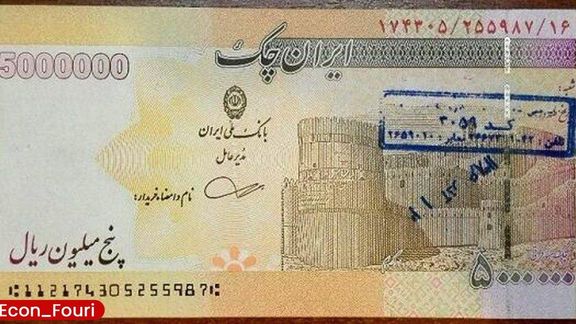
Iranian Central Bank officials are denying that the government is considering introducing a large-denomination bill into its circulation.

Iranian Central Bank officials are denying that the government is considering introducing a large-denomination bill into its circulation.
As the country’s currency, the rial (IRR), continues to depreciate, reports surfaced suggesting the government may bring in a 5 million rial banknote, approximately valued at $7.
Valued at 2 million Rials, the country’s highest banknote in circulation, is barely sufficient to purchase goods worth slightly over three dollars.
For years, inflation and currency fluctuations have eroded the purchasing power of the Rial when compared to other major currencies.
The rial has undergone dramatic devaluation over the decades. Before the 1979 Islamic Revolution, for instance, one US dollar could buy 70 rials.
By early 2018, this surged to about 40,000, and it has since skyrocketed to 670,000.
This depreciation accelerated following the US exit of the nuclear deal in May 2018 and the reimposition of economic sanctions, including on oil exports and international banking activity.
As of August, the country’s monetary base has grown at a rate of 41%, resulting in the government printing about $460 million monthly.
Since taking office in 2021, President Ebrahim Raisi has increased the growth of the monetary base by about 10%.
The monetary base refers to the amount of money in circulation plus the reserves by the Central Bank. Its expansion can lead to inflation.
The introduction of larger banknotes would have social implications, particularly for foreigners exchanging money in Iran who often receive large quantities of rial banknotes for relatively small amounts in dollars or euros, which can be inconvenient or cumbersome to manage.
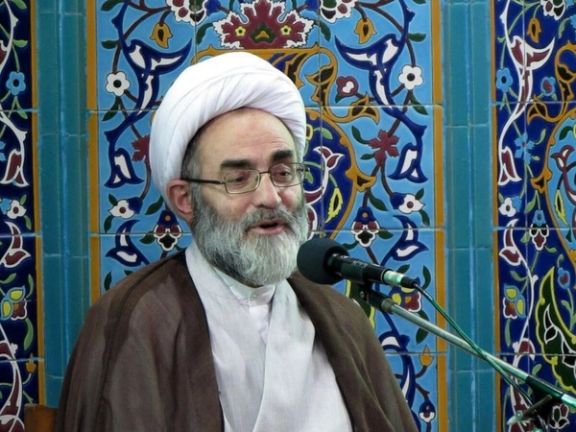
Amidst global media attention on tensions between Israel and Iran, the Supreme Leader's representative in Gilan province suggests that the state should "seize the opportunity" to enforce the country's Islamic hijab laws.
Cleric Rasul Falahati, who leads Friday prayers in the northern city of Rasht, directed his criticism towards media outlets run by the Iranian diaspora, emphasizing the need to act.
"The opposing media, which supports society's current environment of hijab abolition, is now involved in fake Israeli affairs, so we must seize the opportunity and deal with the situation," Falahati said.
Parallel to Iran's direct targeting of Israel over the weekend, the police announced their new hijab enforcement initiative, known as the Nour (Light) Plan, in response to what they claim is a “national and public demand."
Since then, social media has been flooded with videos demonstrating the widespread presence of the so-called morality police and their violent behavior.
While the recent crackdown happened after Supreme Leader Ali Khamenei repeatedly underlined that ignoring the hijab is a red line that should not be crossed, an official close to Khamenei quoted him on Friday, seemingly taking a cautious approach.
Mehdi Fazaeli, deputy chief of the Office for the Preservation and Publication of the Works of the Leader of the Revolution, said the leader had cautioned some officials not to undertake any “irregular and unplanned” actions regarding hijab.
Similarly, Gholamhossein Mohseni Ejei, the head of Iran's judiciary who had called for stronger implementation of hijab laws in early April, on Friday said: “In the matter of chastity and hijab, one should act wisely. We do not want to punish anyone who ignores the rules on the street.”
Although the signal coming from the regime’s authorities has not always been coherent or consistent, the reality on the street shows that the oppression facing women regarding the hijab law has been stepped up massively.
The morality police had largely disappeared from the streets following the death of Mahsa Jina Amini, 22, in their custody, which sparked widespread and months-long protests across the country.
Several women arrested by the morality police during the latest crackdown since the weekend have told Iran International of severe physical violence as well as sexual verbal abuse.
Women's rights activists have voiced their concern over the regime's increased clampdown on hijab laws, which has gained momentum since Saturday.
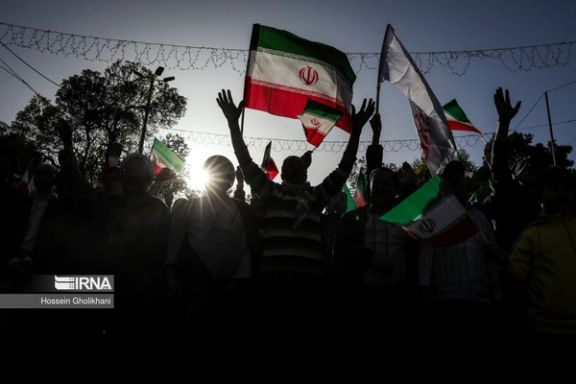
The head of Revayat-e Fath Foundation, an IRGC-affiliated cultural center, said the foundation is going to produce cinematic works on Iran’s offensive against Israel.
Hailing Iran’s missile and drone attacks, Ali Moqavasaz stressed that Revayat-e Fath Foundation intends to memorialize the “historic day” through backing artworks glorifying the event and also organizing a festival.
So far, no filmmakers have announced their readiness to produce works in this regard but we aim to take a serious action and make films about Israel, Palestine and the Islamic Republic’s missile and drone attacks against Israel, he went on to say.
Iran launched a barrage towards Israel on Saturday night of over 350 drones and missiles, most of which were intercepted by Israel and its allies before reaching Israeli territory.
The attack, Iran claims, was retaliation for the alleged Israeli airstrike on the Iranian consulate in Damascus this month, in which a senior Quds Force commander was killed along with other IRGC personnel.
Moqavasaz also pledged that Revayat-e Fath is going to produce cinematic productions about IRGC commanders. However, he did not elaborate on the identities of the financiers of these projects.
The Iranian government does not clearly announce the amount of funds allocated to many state-sponsored organizations and institutions, and the details of their expenditures are not reported at the end of the year.
Four years ago, Revayat-e Fath made a feature film named “Sniper” with a budget of at least 100 billion rials (around $400,000 at that time). The film, which narrated the adventures of a sniper during the Iran-Iraq war, was evaluated by critics as “low quality.”
The foundation also produced in 2011 the notorious movie “Golden Collars” directed by former intelligence officer Abolqassem Talebi. The movie garnered harsh criticisms from the public for its reproduction of the regime’s account of the Green Movement, the unprecedented protests following Iran’s controversial presidential elections in 2009.
Revayat-e Fath Foundation is named after a series of documentaries produced by renowned pro-government filmmaker and author Morteza Avini about Iran-Iraq eight-year military conflict. Iranian officials and state media frequently credit Avini for his ideas of “Islamic and revolutionary art and cinema.” Revayat-e Fath literally means “the narrative of conquest.”
Following the 2022 uprising triggered by the death in morality-police custody of Mahsa Amini, former head of Revayat-e Fath Foundation Mohammad Naderi lambasted artists who supported the nationwide protests, many of whom were threatened with travel bans, work bans and even prison.
“A number of famous figures have been openly and publicly kicking [the government] over the past months. This is our fault because some institutions and organizations were busy making celebrities and ignored the real artists”, Naderi said, further adding that the protesting artists were “useless figures and celebrities” who “betrayed the government, people and country.”
In October, the Iranian government officially released a list of actresses who are prohibited from working in the film industry due to refusal to wear the mandatory hijab. The list includes several well-known figures in the Iranian film industry, such as Baran Kosari, Vishka Asayesh, Taraneh Alidousti, Katayoun Riahi, Panteha Bahram, Hengameh Ghaziani, Pegah Ahangarani, and more.
"Due to the constraints they confront, these actresses will no longer be able to pursue their careers in cinema. Nevertheless, their previous works will be gradually released to safeguard the interests of film producers, given the substantial investments made in these projects. However, they will be barred from participating in any forthcoming film productions," said Habib Ilbeigi, the director of the Supervision Department in the state-affiliated Film Organization.
Despite spending a lot of money, the films and series produced by the Iranian government, tasked with promoting the ideological worldview of the Islamic Republic, have not been able to win the public’s approval in Iran, with some even becoming the butts of ridicule and mockery.
In January, a scene from a TV series was shared extensively by social media users in Iran as it depicted clerics being attacked by security forces several decades ago. Broadcast on Iran’s state TV, “Motherland” (“Sarzamin-e Madari” in Persian) covers the sociopolitical history of the country over a time span of 37 years, from 1942 to the birth of the Islamic Republic in 1979, according to the ruling regime's ideological prism. IRGC-affiliated Fars news agency has hailed the series as “the narrator of the ups and downs of the history of Iran in the contemporary era.”
In one scene, which is apparently aimed at promoting an oppressed picture of clerics during the reign of Pahlavi monarchs in the 20th century, security forces are shown to be shooting and killing clergymen. The scene went viral on X and Instagram as Iranian users remixed it with happy, celebratory and heroic songs in what can be interpreted as an explicit gesture of opposition to the theocratic government in the country.
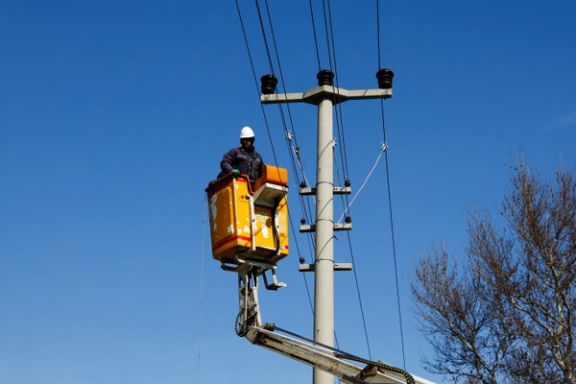
Iran is preparing to sue a sanctioned Turkish businessman and broker over a dispute involving $263 million in debts related to electricity imports.
The complaint against CEO Sitki Ayan and Gent Electricity Energy stems from the company's decade-long failure to settle debts related to Iranian electricity imports, according to Tavanir, the Foreign Trade Office of Iran's state electricity company.
Ayan, a friend of Turkish President Recep Tayyip Erdoğan, previously brokered sales for the Islamic Revolutionary Guard Corps’ Quds Force. This activity led to him and the Gent company being placed on the US Treasury’s sanction list.
The US Treasury states that Ayan used his extensive business network to facilitate and conceal the sale and shipment of Iranian oil on behalf of the IRGC-QF.
The statement, published on December 8, 2022, added that Ayan had established business contracts to sell Iranian oil worth hundreds of millions of dollars to buyers in China, East Asia, the United Arab Emirates, and Europe. He also helped arrange the transportation of Iranian oil and funneled the proceeds of these sales back to the IRGC-QF.
The Turkish private company signed a contract with Iran's Energy Ministry in 2009 to import electricity. Turkey ceased importing Iranian electricity in 2017, but the reasons for Iran's delay in suing Ayan and his company remain unclear.
From 2009 to 2017, Iran exported 11.5 terawatt-hours (TWh) of electricity to Turkey, although the specific share imported by Gent Electricity Energy company is not known.
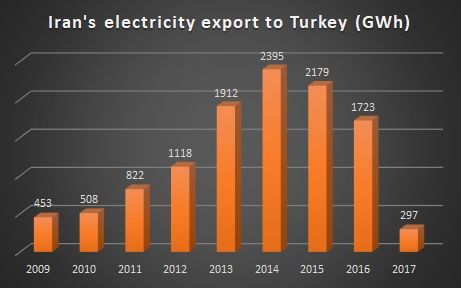
Despite all measures taken, including negotiations between Tavanir and the Turkish private company, as well as diplomatic efforts through various channels, the debts remain unpaid, according to Tavanir director Mehrdad Eglimi.
Iran will now refer the case to the Swiss Chambers' Arbitration Institution, Eglimi said.
Electricity exchange plan
Meanwhile, the Turkish Minister of Energy and Natural Resources, Alparslan Bayraktar, visited Iran earlier this month, and the sides agreed to initiate an electricity exchange in the coming months.
Turkey is set to deliver electricity during Iran's peak consumption period in the summer and receive Iranian electricity during other seasons.
Currently, Iran imports electricity from Armenia, Azerbaijan, and Turkmenistan and exports to Afghanistan, Pakistan, and Iraq. Iran was a net electricity exporter until early 2023, but its power trade balance has now reached zero due to a worsening domestic electricity shortage.
Until the mid-2010s, Iran was exporting 12 TWh of electricity and importing 4 TWh annually. In recent years, its net export volume has decreased significantly due to delays in developing new power plants and rapid domestic consumption growth.
In 2022, it exported less than 5 TWh (a 13% year-over-year decline) and imported about 3.9 TWh (a 28% increase year-over-year). This means Iran’s net electricity export declined from 8 TWh in the mid-2010s to 1.1 TWh in 2022 and reached zero last year.
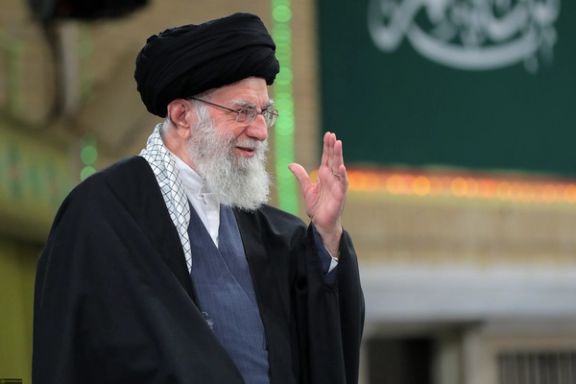
The fundamental policy of the Islamic Republic has traditionally been to avoid direct confrontation with Israel, instead strategically maneuvering its proxy groups across the Middle East like pieces on a chessboard.
This time, spurred by revolutionary slogans and the demands of his supporters, Supreme Leader Ali Khamenei shifted his strategy and accepted the risk of direct confrontation, launching missile attacks on Israeli territory.
A week ago, during Eid al-Fitr prayers, Khamenei declared that "Israel must be punished and will be punished". Similarly, commanders of the infamous Islamic Revolutionary Guards had vowed a "decisive and regrettable response" to Israel’s attacks on Iran’s purported consulate in Syria.
While on the surface the promise of revenge appears to be a strategic mistake, it raises the question as to why the state would pursue such a course of action – despite the international, political, and economic consequences.
The religious approach appears rigid and uncompromising, not open to diverse methods or interpretations. It emphasizes demonstrating resilience, with resistance seen as crucial to victory. In this view, persisting with a "fighting" strategy, even if mistaken, signifies a steadfastness in belief and faith.
The policymaking process in the Islamic Republic, however, does not follow the pattern of rational choice or the model of a prudent actor.
Rationality in foreign policy is a model in which the government acts coherently, and policymaking and decisions are based on clear goals and national interests, defined priorities, sufficient information, and understanding of options to achieve those goals, provided that the likelihood of success and the benefits and costs of each chosen policy are examined and evaluated in advance.
Role of Cognitive Maps in the Decision-Making of the Supreme Leader of the Islamic Republic of Iran
One characteristic of policymaking in the Islamic Republic is the existence of hierarchical and non-systematic decision-making procedures.
The hierarchical decision-making pattern in the Islamic Republic indicates that the Ministry of Foreign Affairs or governments do not have a decisive role in foreign policy policymaking.
Former President Hassan Rouhani and former Foreign Minister Mohammad Javad Zarif frequently criticized the marginalization of the Ministry of Foreign Affairs from foreign policy decision-making and expressed concerns about the military's dominance over diplomacy.
In response to these criticisms, Khamenei asserted in a speech on April 30, 2021, that "foreign policy is determined in high-level forums around the world, not in the Ministry of Foreign Affairs. The Ministry of Foreign Affairs participates in setting policies but is not the decision-maker; it is the executor."
Khamenei even considers the Supreme National Security Council – a key body responsible for overseeing national security affairs – to have a consultative role rather than a policymaking role.
Therefore, the primary determinant of foreign policy decisions is Ali Khamenei, as the only leader of the Islamic Republic.
In such decision-making structures, understanding the mindset of the Supreme Leader is key to comprehending the policies and decision-making model of the Islamic Republic system.
In his book "Perception and Misperception in International Politics," Robert Jervis argues that understanding the cognitive map of the decision-maker can provide insights into their mistakes.
Thus, this means the creation of a diagram of the relationships that the decision-maker perceives to exist between phenomena. By understanding the causal relationships they have in mind, and analyzing their decisions based on these perceptions, we can assess how closely this perceptual understanding aligns with external reality. Additionally, it allows us to determine whether the effects and impacts anticipated by the decision-maker have actually occurred.
But before that, the elements influencing the cognitive perception of the decision-maker must be understood.
Here, our aim is to illustrate the factors influencing Ali Khamenei's cognitive perception regarding the issue of hostility towards Israel.
These factors constitute the backdrop of the cognitive map of the Supreme Leader of the Islamic Republic:
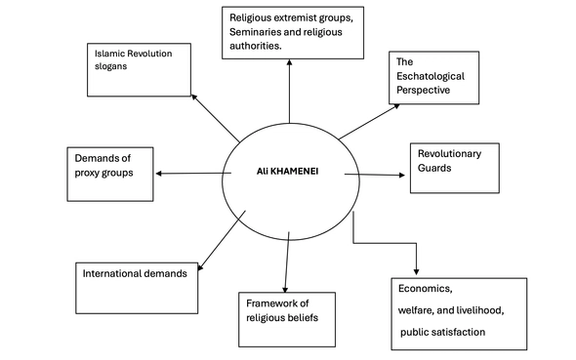
Islamic Revolution Slogans: The destruction and elimination of Israel are merely slogans and not the primary goal of the Islamic Republic. The existence of Israel serves to justify the Revolutionary Guards' extraterritorial operations. Enmity with Israel is necessary for the Islamic Republic to establish a sphere of influence in regional politics and gain credibility with the international community. However, this enmity is often used as a cliché and serves the propaganda of the system.
Unchanging religious beliefs: It is a collection of ingrained patterns in the mind of Ayatollah Khamenei that remain unchanged. Khamenei's interpretations of Quranic and religious matters are subjective and personal. For instance, he asserts that hijab is a religious obligation and unveiling is religiously prohibited, a stance that reflects solely his personal interpretation. In the context of the Israel issue, the "End-time view" serves as a smokescreen, hindering our ability to objectively understand the issues and equations from a rational and logical perspective.
The Eschatological Perspective: The narratives surrounding the end times, particularly concerning the appearance of the Twelfth Imam among Shiites, adopt a geostrategic approach, pinpointing the emergence in Syria and Lebanon. Traditionally, Shiites were expected to await the reappearance passively, but in the new Mahdism, it is argued that they should actively pave the way for the Imam's return. From an eschatological perspective, one of the actions required for the reappearance is the weakening of Israel and Zionist ideology. Equipping fighters against Israel is considered a religious and unequivocal duty for all Muslims worldwide.
Pressure from allied groups and internal systemic pressures are deemed influential factors in Khamenei's cognitive perception. In this regard, hardliners, pressure groups, seminaries, the Revolutionary Guards, and proxy groups all wield significant influence in shaping Khamenei's perception and decision-making process.
International imperatives should also be considered among the factors influencing Khamenei's cognitive perception. Currently, one of the reasons that have made revenge and emotional reactions costly and challenging for Khamenei is these international imperatives.
If we prioritize Khamenei's cognitive map, the people’s interests and the economic welfare of Iranians would be relegated to the bottom row. The interests of the people and public satisfaction exert the least influence on Khamenei's decisions.
All the factors mentioned form the foundation of Khamenei's cognitive perception. However, it's important to note that Khamenei's decisions may not always stem from rational and collective reasoning.
Therefore, despite the significance of international imperatives, the influence of hardliners and Islamic Revolutionary Guards commanders, and the demands of proxy groups for direct engagement with Israel, the system could potentially be led into a significant gamble.
Khamenei in a State of Absolute Inaction
It seems that Khamenei's pieces on the regional chessboard have entered a state of inaction. Under the influence of his supporters' demands, he made a strategic mistake by emphasizing revenge. Khamenei has accepted the risk of attack to leave a historical legacy and proudly show the supporters of the Islamic Republic that the sky of Israel was showered with missiles. Even if Israel does not suffer serious damage, they are proud to have been sincere in their promise to punish Israel.
Another question arises: Why did the Islamic Republic feel compelled to attack Israel?
Commander Salami, the head of the Islamic Revolutionary Guards, announced after the attack, "We have decided to create a new strategy, and that is from now on, if Israel attacks our interests and personalities anywhere, we will counterattack from the origin, the Islamic Republic of Iran".
Could the reason for this change in strategy be the reluctance of proxy groups during Israel’s attack on the purported Iranian consulate, as these groups had no interest in supporting or incurring costs for the Islamic Republic?
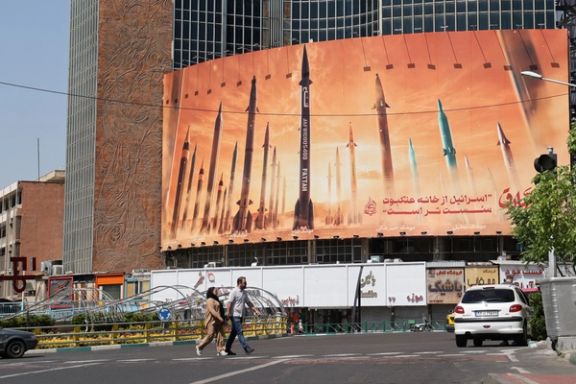
Israeli media cited foreign reports of an strike on Iran on Friday in the absence of official public comment, while Iranian officials and media played down the attack.
The Islamic Republic military officials spoke about small drones being involved, that they claimed were launched from within Iran, not even mentioning the "Zionist entity", Iran's term for Israel.
The strike in the central city of Esfahan (Isfahan) appears to have caused no significant damage and the muted way the story was told in both nations pointed to a determination, at least for now, not to further escalate their conflict.
In an interview with state TV, a person introduced as a resident of Esfahan described the explosions in the early hours of the morning as "nothing more than firecrackers".
The Israeli military and foreign ministries declined comment and there were no immediate public statements from senior politicians apart from hardline security minister, Itamar Ben Gvir, who sent out the one-word message "Feeble!" on social media platform X.
In fact, some commentators believe Israel will not launch a large-scale attack against Iran, trying to avoid escalation. It can continue its undeclared piecemeal sabotage and other attacks, a method many believe has been used frequently since mid-2020.
Israel has a long tradition of maintaining ambiguity over issues like nuclear weapons and intelligence operations and the silence appeared to be part of its messaging.
Israeli media cited reports from the New York Times and the Washington Post, which quoted unnamed Israeli officials as confirming Israel was behind the attack, but did not report official confirmation of their own.
Writing for Israel's biggest newspaper Yedioth Ahronoth, before the attack took place, a columnist said an official had said Israel planned a "pinpoint operation".
He quoted a Bible story in which the future King David crept up on a sleeping enemy and cut a piece of cloth from his clothing as proof that he could have struck a deadly blow but chose not to.
"I think it is ultimately a cautionary message that Israel can respond and can get through to Iran if it wants, but it does not want to widen the scope of this conflict right now," said Hasan Alhasan, a senior Fellow for Middle East Policy at the International Institute for Strategic Studies.
Iran's thoughts were spelt out most clearly by a senior Iranian official who told Reuters that Tehran did not plan a response now.
Iranian media appeared to play down the significance of the strike. In official statements, there was almost no mention that Israel - or as it usually says the "Zionist entity" - was behind it. State television carried analysts and other pundits who all appeared to be dismissive about the scale.
"There has been a remarkable fabrication to exaggerate the extent of the incident" the semi-official ISNA news agency said.
The apparent attack was the latest in a round of actions set off by the killing of seven Iranian officers in a strike on an embassy compound in Damascus that has drawn fears of a wider regional conflict spilling over from the war in Gaza.
Although Israel has never acknowledged that it was behind the strike on April 1, Iran launched a wave of hundreds of drones and missiles in response that was successfully warded off by the air defenses of Israel and its allies.
Iran's reaction also appeared to signal that it did not want the exchange to go further.
"That seems to indicate that Iran is seeking to step down off the ledge, minimize the impact of the attack, and perhaps walk back down the escalation ladder from here," said Jonathan Lord, head of the Middle East security program at the Center for a New American Security, a US think tank.
Iranian President Ebrahim Raisi chose not to cut short his trip to the central province of Semnan, indicating that the country was not on high alert. In Israel, the Homefront Command issued no new instructions to the population.
Opinion polls in Israel have appeared to show no overwhelming desire for retaliation, with one poll on Thursday showing 48% in favor of responding even if it meant expanding the conflict with 52% preferring not responding.
"We're good, you can look around, we're happy here, not from the attack but I think the situation in the Middle East is complicated, but Israel will always win and everybody has to know that," said Pavlo Tzuk, a resident of central Israel.
"So, enjoy your day and hope people in Iran will understand we are not seeking for war, but we are seeking for peace, and we want to be here safe, so, understand that," he said.
(With reporting by Reuters)






